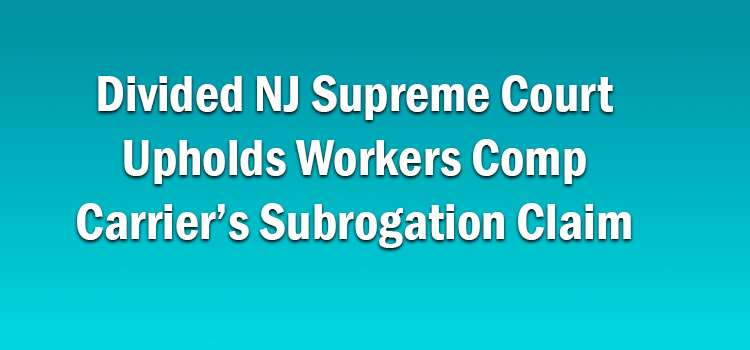In New Jersey Transit Corporation v. Sandra Sanchez (A-68-18/082292) (Decided May 12, 2020), the Supreme Court of New Jersey held that New Jersey’s no-fault auto insurance scheme does not prohibit an employer from suing to recoup workers compensation costs it paid out for a worker’s car accident injuries.

Facts of New Jersey Transit Corporation v. Sanchez
Plaintiff New Jersey Transit Corporation (New Jersey Transit) sought to recover workers’ compensation benefits paid to an employee, David Mercogliano, who sustained injuries in a work-related motor vehicle accident. It sued the individuals allegedly at fault in the accident, defendants Sandra Sanchez and Chad Smith (Defendants). The suit relied a provision of the Workers’ Compensation Act, N.J.S.A. 34:15-40, that authorizes employers and workers’ compensation carriers that have paid workers’ compensation benefits to injured employees to assert subrogation claims.
Defendants argued that New Jersey Transit’s subrogation action was barred by the Auto Insurance Cost Reduction Act (AICRA), N.J.S.A. 39:6A- 1.1 to -35. They maintained that because Mercogliano had elected the limitation-on-lawsuit option permitted by N.J.S.A. 39:6A-8(a), and sustained no permanent injury, AICRA barred New Jersey Transit’s claim.
The trial court granted summary judgment in favor of the Defendants and denied New Jersey Transit’s cross-motion for partial summary judgment. It barred New Jersey Transit’s subrogation action on the grounds that Mercogliano sustained no economic loss as defined in AICRA and that New Jersey Transit’s subrogation claim would subvert AICRA’s goals.
The Appellate Division reversed, agreeing with New Jersey Transit that the workers’ compensation benefits paid to Mercogliano related only to economic loss. It concluded that New Jersey Transit’s subrogation action did not implicate the limitation-on-lawsuit threshold imposed by N.J.S.A. 39:6A-8(a). According to the Appellate Division, because Mercogliano’s economic loss was covered by his workers’ compensation benefits — not by personal injury protection (PIP) benefits under his automobile insurance policy — New Jersey Transit’s subrogation action did not run afoul of AICRA.
NJ Supreme Court’s Decision in New Jersey Transit Corporation v. Sanchez
An equally-divided court affirmed the Appellate Division’s decision. Justice Timpone did not participate.
In a concurring opinion, Justice Anne Patterson rejected the argument that the subrogation action violated the AICRA. She was joined by Chief Justice Stuart Rabner and Justice Faustino Fernandez-Vina.
“We view New Jersey Transit’s subrogation action to comport with the objectives and terms of the Workers’ Compensation Act. We find no evidence that when the Legislature enacted AICRA, it intended to bar employers and insurers that have paid workers’ compensation benefits for economic loss from seeking reimbursement from third-party tortfeasors in cases such as this, in which the employee’s losses were covered by workers’ compensation benefits and he neither sought nor received PIP benefits,” Justice Patterson wrote. “We do not view New Jersey Transit’s subrogation action — limited to workers’ compensation benefits paid for economic losses — to contravene AICRA’s provisions or to undermine its goals.”
In her opinion, Justice Patterson emphasized that that, when it enacted AICRA, the New Jersey Legislature did not amend the Workers’ Compensation Act to eliminate or circumscribe the statutory right of subrogation in cases involving injuries to employees in motor vehicle accidents. The court also found no evidence that the Legislature, in enacting the AICRA, sought to bar employers and insurers that have paid workers compensation benefits from seeking reimbursement in cases such as this.
“Thus, the legislature made clear that when an employee injured in a work-related accident is entitled to benefits under the Workers’ Compensation Act, that statute — not AICRA — provides his or her primary source of recovery for medical expenses and lost wages,” the court said.
The New Jersey Supreme Court rejected the trial court’s conclusion that that once New Jersey Transit had paid Mercogliano’s medical expenses and awarded him disability benefits, there was no longer an “economic loss” at issue, and thus no basis for a subrogation claim. “We discern no evidence that the Legislature intended to bar a workers’ compensation subrogation claim by virtue of the very benefits that created that claim in the first place,” Justice Patterson wrote. “As did the Appellate Division, we conclude that Mercogliano suffered an economic loss in the form of medical expenses and lost wages, and that New Jersey Transit paid him benefits for that economic loss.”
Justice Barry Albin filed a dissent, in which Justices Jaynee LaVecchia and Lee Solomon joined. The dissenters argued that the majority’s decision will “ultimately lead to increased automobile insurance premiums and increased litigation over economic damages incurred in work-related automobile accidents — an outcome in conflict with a series of legislative enactments aimed at making automobile insurance more affordable in this state.”
